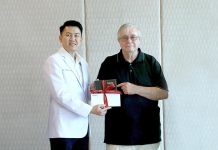What are your chances of surviving cancer? According to some authors, better shift to Taiwan.
The differences in five year survival rates between the UK and Taiwan was put down to the fact that your cancer diagnosis was done more quickly in Taiwan than it was in the UK.
If my late mother’s experience of the UK National Health System is anything to go by, you will be lucky to live long enough for the diagnosis to be made, by the time you actually get your specialist’s appointment and then wait for the test results and then see the specialist again. But, I suppose, if nothing else, it does help cut down the waiting lists!
However, there is a message for us all in this. Timely cancer diagnosis does improve your chances of survival. This is not really rocket science or some new breakthrough. If you leave battery acid on your shirt long enough, it will eat a hole in the fabric. If you leave cancer cells in your body long enough, they can eat so many good cells your life and living is compromised.
Unfortunately, the diagnosis of cancer is generally not made (or the diagnostic procedure even started) until the cancer produces some abnormal symptoms. Those abnormal symptoms are also not made by the cancer itself, but by the organs that have been attacked, or by the sheer physical size of the cancer causing physical problems. Cancer of the lung is a good example of the first case, and cancer of the bowel is often an example of the second type.
We are actually very lucky in Thailand, as there are several centers of excellence in the capital and in the provinces, one being such as my own hospital, the Bangkok Hospital Pattaya.
Now when I say “centers of excellence” I am referring to the speed of diagnosis that is possible, not just the treatments that are available. There are many factors that can influence that speed (the following table has been extracted from Jiwa et al, BMC Family Practice 2007 8:27):
- Need to travel to clinics in the capital may have financial and logistical implications for the patient and therefore lead to procrastination.
- Health professional, different gender of GP may deter some patients from presenting with embarrassing symptoms that require intimate examination for diagnosis.
- Equivocal tests necessitate repeat visits to clinic.
- Lack of coordination for individual patients’ needs may result in inconvenient scheduling of appointments.
- Limited scope to obtain second opinions.
- Access to specialists limited by distance from capital.
As you can see from the table, we are very lucky in the metropolitan areas of Thailand, as the centers of excellence can easily cover the six factors. What is also not expressed in the six point table, is the speed of test result returns. Where we enjoy a 60 minute turnaround for blood tests, patients in the UK receive their results in days, not minutes. Similarly, appointments for CT scans and MRI’s here are usually ‘same day’ with results usually the same speedy service.
So, timely diagnosis is very possible in this country, but unfortunately there are still instances of late diagnosis, but in the majority of cases this has occurred through ignoring the symptoms or ignorance of the importance of the symptoms. The simple advice is to never ignore any deviation from ‘normal’ in your body – after all, you know your body better than anyone else.
There is also a somewhat mistaken idea that your annual check-up will uncover all cancers, so you don’t have to do anything until next year. Certainly there are some cancers that are detected in this way, but whilst the annual check-up can discover many endocrine problems, blood problems and cardiac abnormalities, it is not going to uncover cancer in the brain, bones or skin, unless they are very advanced.
Timely diagnosis does come back to your ability to inform your doctor of changes. Do not feel embarrassed that it “might be nothing”. Let me assure you that all doctors enjoy informing people that they have not got a problem after diagnostic testing, rather than the other way round!




